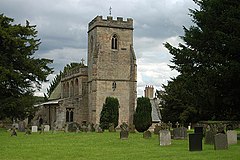Blithfield
| Blithfield | |
|---|---|
 St Leonard's Church, Blithfield |
|
| Blithfield shown within Staffordshire | |
| Population | 230 (2011) |
| OS grid reference | SK044239 |
| Civil parish |
|
| District | |
| Shire county | |
| Region | |
| Country | England |
| Sovereign state | United Kingdom |
| Postcode district | ST16-ST21 |
| Dialling code | 01283 |
| Police | Staffordshire |
| Fire | Staffordshire |
| Ambulance | West Midlands |
| EU Parliament | West Midlands |
| UK Parliament | |
Blithfield is a civil parish in the East Staffordshire district of Staffordshire, England. It includes the settlements of Admaston (a small hamlet in Staffordshire), Newton (Which forms part of the A34, linking between Walsall and Cannock) along with Blithfield Hall, home of the Bagot family since 1360. It is situated 7.5 miles (12.1 km) southwest of Uttoxeter and 4.5 miles (7.2 km) north of Rugeley. Blithfield and Admaston comprise 1,414 acres (572 ha) of land, with Newtown occupying 1,744 acres (706 ha). The nearest railway stations are Rugeley Trent valley (3miles away) and Rugeley town (3 miles away).
A parish like Blithfield is normally formed around a small settlement. Blithfield used to be centered around the Parish Church. At the end of the 1800s Church and State divided and this area is now represented as "a local authority by the Blithfield Parish Council and the Church of England by the Parochial Church Council". The population in Blithfield decreased from 439 people in 1801 to 262 people in 1961. According to the 2001 census it has a population of 225, situated within 96 households. The number of houses has stayed relatively stable since 1830, fluctuating from 81 houses in 1830, dropping to 65 in 1920 and then steadily increasing until 2001. 173 of the 225 people in 2001 were between the ages of 16 and 74.Blithfield Reservoir takes up much of the parish and the area is home to the Bagot goat.
The first part of the name "Blithfield" is simply an alternative spelling of the word "Blythe", which originates from Old English word "blitha" meaning 'gentle'. The second part stems from the Old English "feld", which meant 'open or accessible land'. However, by the time Blithfield became its name, it might "just as well be interpreted in the modern sense of 'field'".
...
Wikipedia

